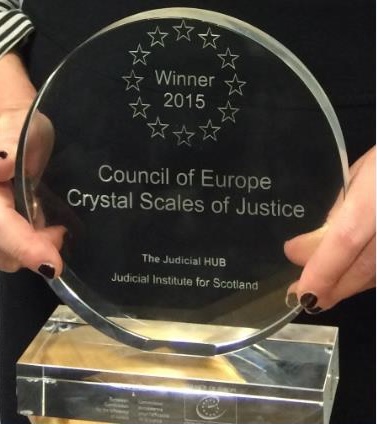2 Courts and the digital future
Courts and legal processes are set to look very different in future. The possibilities offered by digital technologies are being considered. They have already been utilised in some areas. For example, electronic submission of all civil and criminal legal aid applications has led to greater efficiency. Within the criminal justice system the Scottish Legal Aid Board, Police Scotland, Scottish Court Service and Scottish Prison Service have introduced live video conferencing TV links allowing legal firms to speak with clients without having to attend prison. The accused and offenders can also appear at court without having to be transported from police stations and prisons. The Scottish Court Service is also piloting electronic jury management, allowing people who have been cited for jury service to correspond in writing or digitally.
Box 1 Digital technologies and the justice system
To achieve our aims in a digital world, our justice systems need to embrace digital technology – we need to look beyond traditional methods and transform how we think; how we engage and how we deliver services to citizens and users.
Our strategy supports Scotland’s Digital Future: Delivery of Public Services, Central Government Strategy and the justice sector will be early adopters of a number of the digital initiatives arising from this strategy. We will adopt a digital first approach to transform how we do business, improving ourselves and our services to create open, transparent, accessible justice systems which respond to changing circumstances. It will also allow us to serve and protect citizens in a more intelligent and proactive way.
We want to use digital technology wherever possible to broaden access to justice, improve quality of service and safeguard the rights of citizens and users. By digitising our justice systems and operating efficient processes, we can at the same time lower our costs.
Delivering these outcomes cannot be done in isolation. We will continue to take a collaborative approach. Justice organisations, the broader public, private and voluntary sectors will all need to work together to deliver our aims.
Our justice systems are changing and so is what can be done using digital technology. We want to be at the forefront of this innovation and use the opportunities that new digital solutions bring.
We will, then, continually review this strategy and revise the objectives and targets we have set and deliver with pace the changes which our users expect.
The Judicial Institute for Scotland [Tip: hold Ctrl and click a link to open it in a new tab. (Hide tip)] (providing training and associated resources for the judiciary) was awarded the Crystal Scales of Justice Prize in 2015 in recognition of its innovative practices aimed at improving both quality and access to justice. The Judicial Hub is a ground-breaking custom-built platform designed to meet the information, learning, collaboration and communication needs of all judges, sheriffs, and justices of the peace in Scotland. It represents a significant step forward and has set the standard for judicial institutions in Europe.

